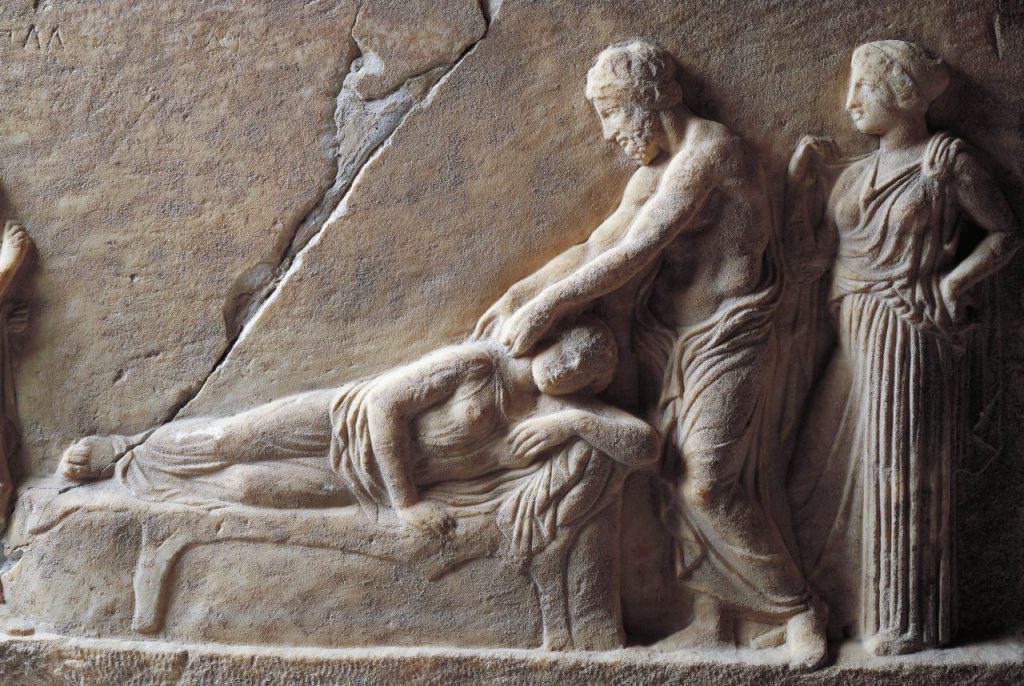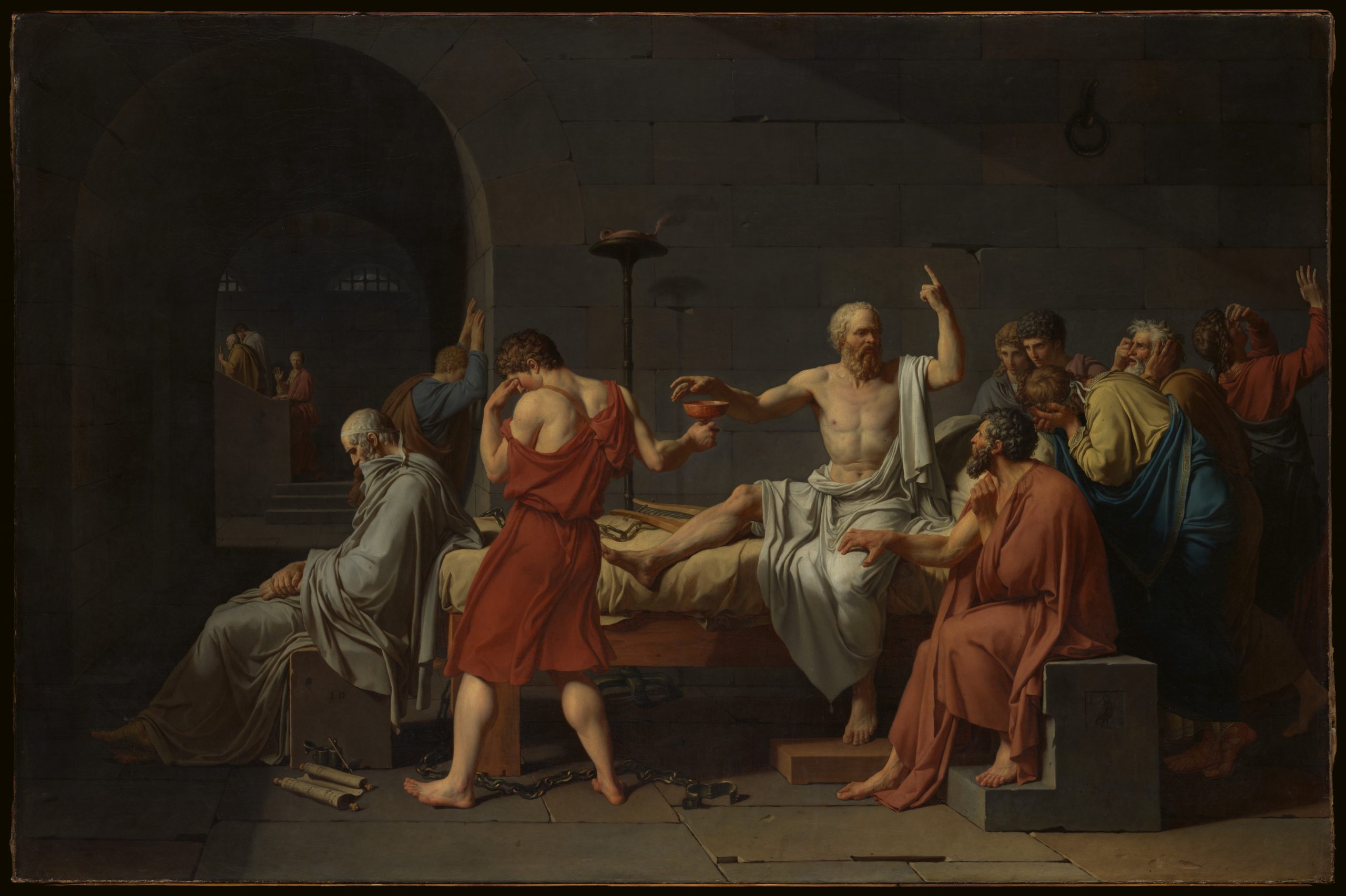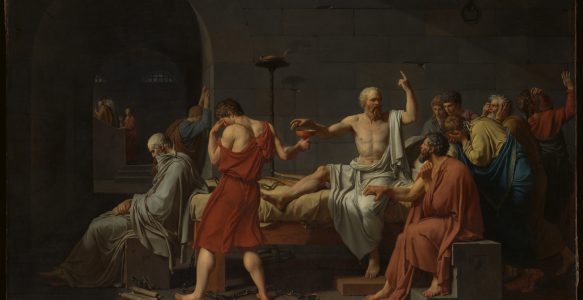by Bowen Xiao
Socrates drinks the hemlock potion given by the jailor. Along with the weeping of his philosopher friends, his legs become heavier. When coldness and stiffness arrive, he is convinced that he would go by the time emptiness reached his heart. Right before the arrival of death, he utters the famous yet inscrutable line:
“Crito, we owe a cock to Asclepius. So pay the debt and don’t be careless.” (Phaedo, 118).
The common interpretation of this line concludes that the hemlock potion is the key to the entrance of afterlife. In Plato’s Phaedo, Socrates proves the immortality of souls with four arguments, including The Argument from Opposites, the Theory of Recollection, the Argument from Affinity, and the Rebuttal to Cebes’s View. He attempts to free Cebes and Simmias from the fear of death throughout the whole dialogue. I argue that, Socrates is grateful to Asclepius, the god of medicine who gives him the potion, for freeing him from the human world.
One of the famous interpretations of Socrates’ last words comes from German philosopher Friedrich Nietzsche. Nietzsche, though he revered Socrates’ “courage and calmness” before his execution, was dismayed by Socrates’s last words:
“This ridiculous and terrible ‘last word’ means for those who have ears: ‘O Crito, life is a disease.’ Is it possible that a man like him, who had lived cheerfully and like a soldier in the sight of everyone, should have been a pessimist?” (The Gay Science, Nietzsche).
According to Nietzsche, the last word resembles “revenge” or sacrilege to life. However, Rempel argued that Nietzsche’s explanation has fallen into the trap of dualism (Rempel, 2006). While Socrates might welcome the healing from Asclepius, he does not express direct hatred and cowardice toward life in the text (Rempel, 2006). In other words, Socrates conquers deathmeans by means of intentionally giving up life.
To Socrates, death opens the possibilities of more wisdom and verifies his philosophical presumptions. In Phaedo, Socrates mentions the soul “goes away into that which is like itself, into the invisible, divine, immortal, and wise, and when it arrives there, it is happy to be freed from error and folly and dear and fierce loves…” (Phaedo, 81A). His longing for the “upper world,” however, does not motivate him to commit suicide. By contrast, he deems that human beings, as the servants of gods, have no right of taking their own lives away. Therefore, the rumor of Socrates dying of suicide would not be logically consistent, based on Plato’s dialogue.
A closer examination of Socrates’ last words undoubtedly raised the question of his selection of a “cock” as a sacrifice. To begin with, the cock itself is often linked with Pythagoreanism, whose adherents seldom sacrificed inanimate objects. Some presume that Socrates meant to indicate his contempt for these ideas to the Pythagorans Cebes and Simmias. However, the evidence to support this claim is limited. Pythagoreans designated specific animals to be sacrificed, including roosters (Mitscherling, 1985).
In ancient Greece, roosters represented two things which Socrates may have been indicating. Firstly, the reference to cockfighting was prevalent in various literature and historical sources. The cockfighting could allude to argumentation and debates between philosophers. Using “cock” as a metaphor, Socrates might imply his victory in the debate with other philosophers, for he convinces Simmias and Cebes to follow his beliefs.
Secondly, roosters announced the beginning of a day by crowing, awakening other animals and humans from hibernation to liveliness (Dalby, 2003). “Sleep and Death are brothers” (Griffith, 2017). Socrates implied the similarities of these two terms as when he drank the hemlock potion, he was looking for being “awakened” by death. In one of the myths, Asclepius, the god of medicine who gives Socrates the potion, cures people’s diseases in dreams. After the patients wake up, the diseases would be alleviated and eventually cured. Socrates was entering the mortal realm of “dream,” potentially waiting for the guidance of Asclepius to wake him up (Griffith, 2017).

Socrates demonstrates his courage and longing for the afterworld throughout the conversation with friends. His goal is to convince and encourage Simmias and Cebes to embrace death and to follow his path. Socrates introduces key concepts, such as souls, the afterworld, and perfection, to his friends, in order to eliminate their fear for death. For instance, he asserts that death is a gift to philosophers, as it enables them to view the truth of the soul and body separately (Phaedo, 61). Therefore, philosophers, with the instinct to pursue truth and perfection, should not be manipulated by fear (Phaedo, 61).
The final words are his last effort to enlighten his friends. As he diffuses the idea of conquering and awakening from death, Cebes agrees, “Very well” (Phaedo, 118). His consent might have brought a great relief for Socrates. This line can be examined as his promise to Socrates’ request, of sacrificing a cock, and more profoundly, getting over the fear of mortality. When Cebes asks if Socrates has anything else to say, Socrates never answers, but waits silently for the end. He has accomplished his final goal before he was “awakened.”
Works Cited
Bailey, James E. “Socrates’s Last Words to the Physician God Asklepios: An Ancient Call for a Healing Ethos in Civic Life.” Cureus vol. 10,12 e3789. 28 Dec. 2018, doi:10.7759/cureus.3789
Dalby, A. 2003. Food in the Ancient World from A to Z. London and New York.
Dyer, L. and T. Day Seymour. 1914. Plato: Apology of Socrates and Crito. Boston. (Reprint: New Rochelle, NY 1984).
Madison, Laurel A. “Have We Been Careless with Socrates’ Last Words?: A Rereading of the Phaedo.” Journal of the History of Philosophy, vol. 40 no. 4, 2002, p. 421-436. Project MUSE, doi:10.1353/hph.2002.0072.
Mitscherling, Jeff. “‘PHAEDO’ 118: THE LAST WORDS.” Apeiron: A Journal for Ancient Philosophy and Science, vol. 19, no. 2, 1985, pp. 161?65. JSTOR, http://www.jstor.org/stable/40913555. Accessed 1 Sep. 2022.
Plato, et al. Plato’s Phaedo. Newburyport, Focus Publishing/R. Pullins, 1998.
R. Drew Griffith. “Socrates’ Dying Words (Plato Phaedo 118a) as an Aesopic Fable.” Phoenix, vol. 71, no. 1/2, 2017, pp. 89?101. JSTOR, https://doi.org/10.7834/phoenix.71.1-2.0089. Accessed 1 Sep. 2022.
Rempel, Morgan. “Nietzsche on the Deaths of Socrates and Jesus.” Minerva – An Internet Journal of Philosophy, vol. 10, 2006, www.minerva.mic.ul.ie/vol10/Jesus.html. Accessed 1 Sept. 2022.
Wells, Colin. “The Mystery of Socrates’ Last Words.” Arion, vol. 16, no. 2, 2008, www.bu.edu/arion/files/2010/03/Wells-Mystery-Socrates.pdf. Accessed 1 Sept. 2022.


